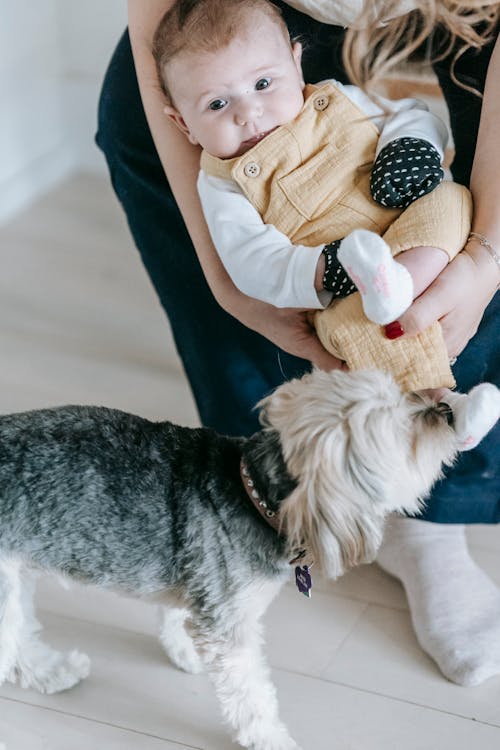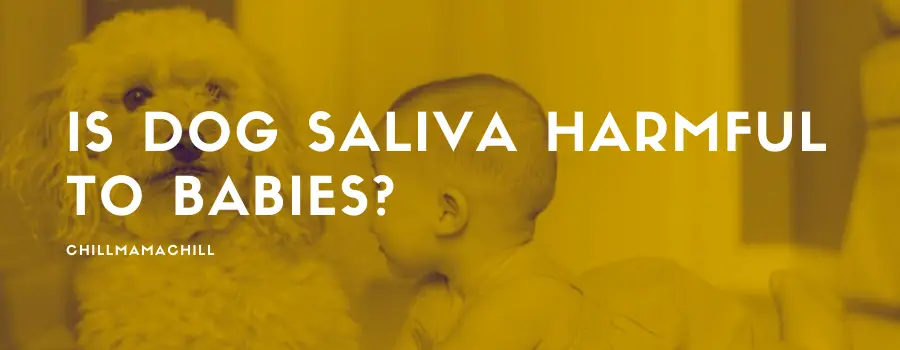When you bring your baby home, you may observe unexpected and strange behavior from your canine. It may be for play, communication, or asserting their dominance, dogs love to lick, slobbering on your child’s face. But is dog saliva harmful to babies?
Under no circumstances should you let dog saliva come into contact with your baby. For one, it’s unhygienic, seeing as the mouth of a dog is a haven for bacteria. Also, your canine could be trying to assert dominance which sets up a dangerous dynamic that can result in your child getting bitten.
For the stellar health and safety of your baby, don’t let your mutt’s wet nose come near chubby cheeks. Your dog may be curious about the tiny squealing bundle. But it’s not okay for them to get up close and personal. To see what disease-causing germs linger in your dog’s mouth, and how they could be using saliva to pass on submissiveness, keep reading.
Should I Allow My Dog to Lick My Baby’s Face?
There’s a myth that dog mouths are cleaner than ours, which can only be true if they brushed their teeth. Mutts are also prone to picking up garbage scraps and even feces to eat. That makes their bodies a haven for harmful organisms. You can withstand infections from your dog’s saliva, but your baby’s undeveloped immune system isn’t as robust.

Dogs use their mouths for many activities, some of which are outright gross. For instance, your canine’s tongue is their toilet paper, and they communicate between species by testing the taste of their behinds. They also have an undiscerning behavior of licking faces, where the mucus membrane makes microbial absorption easier.
A lick from a dog may have serious consequences for your baby. If your dog’s diet comprises raw meat or chicken, there are multitudinous amounts of zoonotic bacteria in their mouth. Other than systemic oral or gum infections, your baby can get salmonella, E-coli, and worms.
When your dog is eager to lick your baby, you should be concerned about safety. While some dogs will use licking as an appeasing gesture of submission, others will do it as controlling behavior. Without proper training, your pet can attack your child as a way of defending you, their human. You must set boundaries so that your mutt knows to express their love for your tot from afar.
What Are the Dangers of Dog Saliva Coming into Contact with Babies?
Sometimes, your canine is not the offender, but your toddler’s habit of putting dog chew toys in their mouth. Saliva on these playthings is said to decrease the risk of developing asthma and allergies. But it can cause illness or parasites like ringworms and roundworms. A child’s developing immune system may benefit from being exposed to certain germs, but what comes out of dogs’ mouths will be taking that idea to the extreme.
What will barely affect an adult can present a serious health risk to babies. A plethora of unsightly items that your dog eats, chews on, or picks up to walk across the yard with. It’s not entirely true that what lives in the alkaline mouths of dogs won’t survive in your baby’s acidic oral environment.
Periodontal Bacteria
A 2001 study found that periodontal bacterial, which occurs rarely in people, is present in canine mouths and saliva.
Humans found infected were in close contact with their canines, with the microbes causing gum disease, tooth loss, kidney, and heart complications. It’s certainly not fair to expose your baby to teeth-eating coliform before their first has popped.
Staphylococcus Bacteria
Other than the Escherichia coli, campylobacter, and salmonella bacteria I’ve mentioned earlier, dogs carry Staphylococcus. Also known as ‘Group A Strep,’ these microbes take residence in your dog’s throat where saliva easily transfers it to your baby. That starts a vicious cycle where your pet canine picks strep throat from adults to your child and back again, brutal to their developing immunity.
Leptospirosis Bacteria
Another disease to watch out for is called Leptospirosis. Your dog, if not vaccinated, can act as a conduit for the bacteria, which is found in the feces or urine of infected wild animals. They’ll pick up these microbes from deer, skunks, and raccoons frequenting areas your canine comes into contact with. Results of this infection include kidney and liver failure in humans and dogs.
Intestinal Parasites
Intestinal parasites and worms can be transmitted through dog saliva to your baby. The greatest concern of these is cryptosporidium and roundworms. You can be facing additional risk if your canine pet sticks their noses in other dog’s backsides or comes into contact with feces.
Cryptosporidium is a worm that causes a disease known as cryptosporidiosis diarrhea. The frightening malady, while more uncommon nowadays than in the 1980s, can seriously affect your baby. Its larva migrates to various parts of the body, causing watery stool and is life-threatening.

Roundworms are caused by Toxocara. That’s an immature worm present in small numbers within your stomach if you haven’t dewormed. The larva likes living in the eye and can cause babies and young children to suffer partial or complete loss of vision. Symptoms include fatigue, abdominal pain, coughs, and wheezing, but the worms can also affect the central nervous system or brain.
Behavioral Problems
Your dog shouldn’t be allowed to lick the baby as they’ll start exhibiting signs of dominance. Your pet could be ‘mothering’ your child by licking them in the face. But it may take things further and begin to nip, growl, snap or paw if it misinterprets your baby’s crying or cooing behavior as pack-unfriendly.
If you allow your dog to lick your baby, it’ll start to view them as their puppy. You can stop this mothering behavior before it escalates by discouraging licks. Besides that, previously undetected traits and instincts can arise if your canine is too close to a newborn.
The smell, sounds, and sight of your tit can excite your pet, which ends up displaying aggression or protectiveness. Playfulness can also turn deadly, with licking and biting from an enthusiastic mutt. Your territorial dog is not immune from feelings of jealousy. Spending more time with your baby can result in resentment or ill-will towards your tot.
Conclusion
You need to keep a close eye on your dog in the presence of your baby, ensuring no licking or passing of saliva. Keep your canine pet busy while you’re tending to your toddler, who in turn should be kept away from the dog’s chew toys. Eliminate the attention you give your mutt when they lick, as they perceive positive or negative feedback as rewarding behavior.
Besides preventing contact between your canine and baby, you must regularly deworm your dog as well as watching where they poke their noses is essential. You can also minimize the potential risks of infected saliva by removing poop from yards while practicing proper hygiene.

I’m Cathrine and I’m a 39-year-old mother of 3 from Utica, New York. And I’m extremely happy you’ve come to visit my hide-out on the web. Here I post about everything related to family-life and usually it will involve babies and lessons I’ve learned over the years from experts, friends, and my own mistakes. So hopefully you will find what i write fun and informational!

